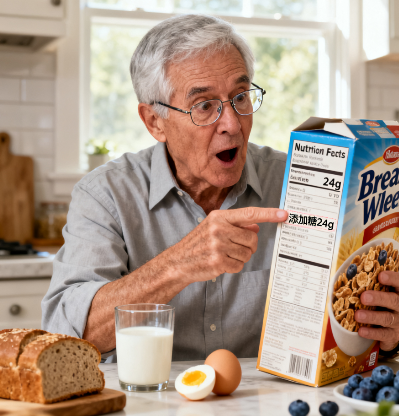
This Popular Breakfast Food Isn’t as Healthy as It Seems—It Contains…
You’re trying to start your day right. You’ve passed on the bacon and sugary cereals, opting instead for what seems like a smart, wholesome choice: a fluffy, golden-brown muffin, perhaps bran or oatmeal, maybe even one studded with blueberries. It feels like a virtuous decision—a hearty, bakery-style treat that promises fiber and energy to power you through the morning. What could be wrong with that?
For those of us in our 50s, 60s, and beyond, who are mindful of heart health, blood sugar, and maintaining a healthy weight, this common breakfast choice might be secretly working against our goals. The problem isn’t the oats or the hint of fruit; it’s what holds it all together. That seemingly healthy muffin is often loaded with hidden sugars and unhealthy fats, making it closer to a cupcake in disguise than a health food.
The Cupcake in Health Food Clothing
Walk into any coffee shop or bakery, and the muffins are enormous—often the size of a small cantaloupe. To achieve that desirable moist, dense texture and long shelf life, commercial muffins rely on a surprising amount of refined ingredients.
- The Sugar Shock: A typical large bakery or store-bought muffin can contain between 30 to 50 grams of sugar. To put that in perspective, that’s the equivalent of 7 to 12 teaspoons of sugar—sometimes more than a can of soda. Even “healthy” versions like bran or whole-wheat muffins are often packed with sugar or honey to make the high fiber more palatable. This causes a rapid spike in blood sugar, followed by a crash that leaves you hungry, tired, and craving more carbs just a few hours later.
- The Refined Flour Problem: Many muffins are made primarily with refined white flour. This flour acts just like sugar in your body, offering little nutritional value and quickly converting to glucose in your bloodstream.
- The Low-Fat Trap: In the past, “low-fat” muffins were promoted as the healthier option. To compensate for the loss of flavor and moisture when fat was removed, manufacturers often added even more sugar. This trade-off is detrimental to metabolic health.
A Better Way to Start Your Day
This doesn’t mean you have to give up on a convenient, portable breakfast. It just means becoming a savvy label reader or, even better, taking control by baking your own.
If You Buy:
- Read the Label: Look for muffins with less than 10 grams of added sugar and at least 3-5 grams of fiber. The first ingredient should be a whole grain, like whole-wheat flour or oats.
- Check the Size: Be realistic about portion size. A true serving is often much smaller than what is sold. Consider splitting a muffin with a friend or saving half for later.
The Best Option: Bake Your Own
Baking muffins at home is simpler than you think and puts you in complete control. You can drastically reduce the sugar, use healthy fats, and pack them with nutritious ingredients.
A Simple, Healthier Blueberry Muffin Recipe:
- Dry Ingredients: 1.5 cups whole-wheat pastry flour, 1/2 cup old-fashioned oats, 1 tsp baking soda, 1/2 tsp cinnamon.
- Wet Ingredients: 1 cup plain Greek yogurt, 1/4 cup honey or maple syrup, 1 large egg, 1/4 cup unsweetened applesauce, 1 tsp vanilla extract.
- Add-in: 1 cup fresh or frozen blueberries.
Instructions:
- Preheat oven to 375°F. Line a muffin tin with paper liners.
- Mix dry ingredients in a large bowl.
- In another bowl, whisk wet ingredients until smooth.
- Gently fold the wet ingredients into the dry ingredients until just combined. Do not overmix. Fold in the blueberries.
- Divide the batter among the 12 muffin cups.
- Bake for 15-20 minutes, until a toothpick inserted comes out clean.
These muffins are naturally sweetened, higher in protein and fiber, and contain healthy fats. They provide sustained energy without the sugar crash.
Making a truly healthy choice in the morning sets a positive tone for the entire day. By looking past the healthy-looking packaging and understanding what’s really in your muffin, you can make choices that support your energy, your health, and your long-term well-being. It’s a small shift in awareness that leads to a much healthier and more satisfying start to your day.